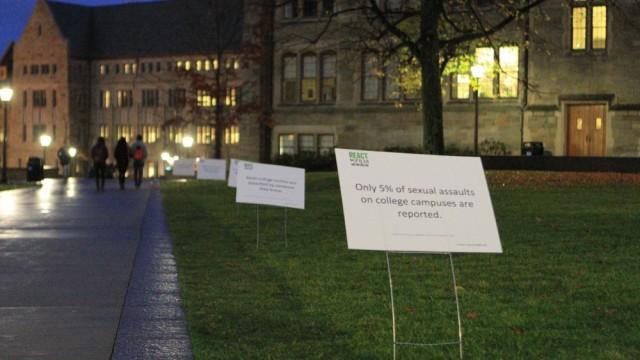Boston College’s 2017 Clery Act crime statistics disclosures revealed a continuation in the past few years’ trend of increased reporting of sexual assault, to 35 in 2016 from 27 reported in 2015 and 23 in 2014. Those numbers were increases from seven in 2011, five in 2012, and 10 in 2013.
The statistics included in the Clery Act include rapes, burglaries, liquor law violations, and many other crimes that occur both on and off-campus. In each Clery report, the statistics for the past three years are included.
These figures are reported in accordance with the Clery Act, a 1990 federal statute that requires all colleges and universities that receive federal funding to record and publish information about crime on and around their campuses. BC published its Annual Security Report with Clery numbers on Oct. 1.
BC’s peer schools have also seen general reporting increases. The number of sexual assault cases reported at Georgetown University in 2014, 2015, and 2016 were 14, 13, and 23, respectively. At Fordham University, the number of sexual assault incidents was seven in 2014, five in 2015, and 15 in 2016. At Harvard University, the number of these incidents was 43 in 2014, 54 in 2015, and 43 in 2016. Tufts University reported that the number of sexual assault incidents was 14 in 2014, 25 in 2015, and 22 in 2016.
Melinda Stoops, associate vice president of Student Affairs and BC’s Title IX Coordinator, said the rise in number of sexual assaults reported could be a consequence of the many different programs on campus that promote bystander awareness and the many different avenues that are available to report rape through.
“This could be because of the increasing attention to the issue of sexual violence across campus and across our country,” Stoops said. “I think students are more aware of this issue, and more aware of how to respond to this issue, which includes reporting.”
Every freshman coming into BC must complete Haven training online over the summer before their first year. This teaches incoming students about how to recognize signs of sexual assault and what to do once they recognize these signs.
Along with Haven and a seminar during Welcome Week, every BC student must complete bystander intervention training, which is done by Stand Up BC and educates students about how to be aware of potential sexual assaults that may be occurring around them, especially in party situations.
“Can I say with certainty that this is what we can attribute the increased number to? No, because there is no way to know for sure,” Stoops said.
The reporting process that BC uses for sexual assault has not changed with the increased number of reported sexual assaults. Students can go to a number of different resources, including BCPD, the Sexual Assault Network, or SANet, a member of Residential Life staff, or the Office of the Dean of Students, to report sexual assault. From these sources, the campus police will then become involved.
“We have regular meetings with the police (about Clery reporting) to make sure the rapes are reported properly,” Stoops said. “The numbers are there for transparency.”
Featured Image from Heights Archives



















